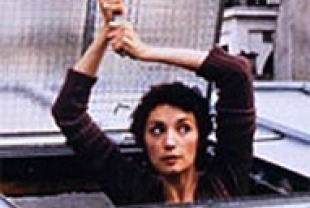Jacques Rivette began his film career as a cameraman for Francois Truffaut and Eric Rohmer. This is the 73-year-old director's nineteenth feature film, and it is a playful, charming winner. There is a distinctive flow to his romantic stories: time seems to be pulled open and almost expanded. Another mark of his work is the use of theatre as the setting where characters swoop and swerve around each other.
Camille (Jeanne Balibar) has returned to Paris after a three-year absence to perform in an Italian production of Luigi Pirandello's As You Desire Me. Ugo (Sergio Castellitto), the director and lead actor in the touring company, is in love with her. But she is ill at ease on the opening night, unwilling even to take a bow at the end of the play. It turns out that she's still pining for Pierre (Jacques Bonnaffé), an erudite philosopher who is entranced with Heidegger.
Camille's meeting with her old lover leads to an invitation for dinner with his wife Sonia (Marianne Basler), who teaches ballet to young girls. Meanwhile Ugo, trying to distract himself from the poor box office for their production, starts tracking down a long-lost unpublished play titled The Destiny of Venice by Goldoni, an eighteenth century Italian playwright who gave it to a French friend for safe-keeping. Discovering a archive of Goldoni's works in a private home, Ugo accepts the help of a beautiful young woman who lives there, Do (Héléne de Fougerolles), in looking for the manuscript. She becomes romantically interested in him. Her brother, Arthur (Bruno Todeschini), a wheeler dealer, is about to steal an expensive ring, an act that will draw several of the main characters together in a strange but dramatically satisfying alliance.
This French romantic comedy makes fine use of the city of Paris as its backdrop. The clever storyline contains a reference to Heidegger's little hat, a daring escape by Camille, an uncomfortable dinner for four at Pierre's place, a funny satire on duels to the death, and a batch of scenes that take place in book-lined rooms.
The performances are all of the highest order with special nods going to Jeanne Balibar as the indecisive Camille, Sergio Castellitto as the good natured Ugo, Héléne de Fougerolles as the alluring Do, and Marianne Basler as the enigmatic Sonia.
